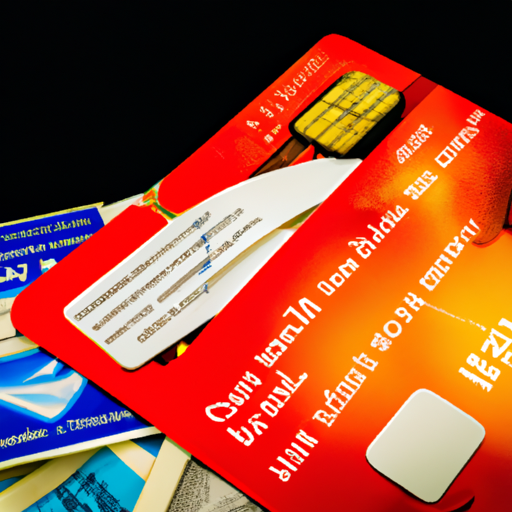In times of emergency, having a credit card can be a crucial asset. Whether it’s a natural disaster, a medical emergency, or unexpected travel expenses, credit cards can provide a sense of security and financial support when you need it most. With the ability to access funds quickly and conveniently, credit cards offer a lifeline that can help you navigate through tough times with ease. From purchasing essential supplies to covering unforeseen expenses, credit cards play a vital role in your emergency preparedness toolkit.
The Role of Credit Cards in Emergency Preparedness
Emergencies can happen unexpectedly, disrupting our lives and leaving us in urgent need of financial assistance. Having access to immediate funds is crucial in such situations, and credit cards can play a significant role in helping you navigate through emergencies. In this article, we will explore the usage and advantages of credit cards in emergencies, as well as potential disadvantages and tips for using them effectively.
Usage of Credit Cards in Emergencies
When faced with an emergency, credit cards can serve as a lifeline by providing you with the necessary funds to cover immediate expenses. Whether it’s a medical emergency, car repairs, or a sudden job loss, credit cards can offer a convenient and accessible source of funds. By utilizing your credit card, you can quickly obtain the financial assistance you need without relying on traditional loans or struggling to gather enough cash on short notice.
Advantages of Using Credit Cards in Emergencies
Ease of Access to Funds
Credit cards provide a readily available source of funds during emergencies. As long as you have your credit card with you, you can access your credit line almost instantly. This ease of access eliminates the need to visit a bank or go through extensive paperwork to secure a loan, ensuring that you can quickly address urgent expenses.
Acceptance and Convenience
One of the significant advantages of credit cards is their widespread acceptance. Credit cards are accepted at millions of establishments worldwide, including hospitals, hotels, and grocery stores. This universal acceptance allows you to make necessary purchases and payments without worrying about having enough cash on hand. Moreover, credit cards offer the convenience of online payments, enabling you to pay bills or make essential purchases from the comfort of your own home during emergencies.
Potential Disadvantages of Using Credit Cards in Emergencies
While credit cards can be beneficial during emergencies, it’s essential to be aware of potential drawbacks that come with their usage.
High Interest Rates and Fees
One major disadvantage of credit cards is the high-interest rates they often carry. If you are unable to pay off the balance in full or make timely payments, you may end up accumulating significant debt due to the accrued interest. Additionally, credit cards may also come with annual fees, late payment fees, or transaction fees that can further impact your overall financial burden.
Risk of Overspending
Using a credit card during an emergency can lead to impulsive spending. Amidst the stress and urgency of the situation, it becomes easy to lose track of your expenses and overspend. It’s crucial to maintain financial discipline and use your credit card for necessary expenses only. Assuming you will pay off the debt later may lead to long-term financial strain if you accumulate more debt than you can handle.
Security Concerns
Credit card fraud and identity theft are ongoing concerns in today’s digital age. During emergencies, when your focus is primarily on resolving the immediate situation, you may inadvertently become more susceptible to scams and fraudulent activities. It is vital to keep a close eye on your credit card statements, set up transaction alerts, and immediately report any suspicious or unauthorized charges to your credit card company.
Tips for Using Credit Cards in Emergencies
While credit cards can be a valuable tool during emergencies, it’s crucial to use them responsibly and effectively. Here are some tips to help you navigate through emergencies while minimizing potential drawbacks.
Have a Backup Plan
While credit cards can provide financial assistance during emergencies, it’s always wise to have a backup plan. Consider having a separate emergency fund to cover unexpected expenses or explore other means of obtaining financial assistance. This way, you can diversify your options and mitigate any potential issues that may arise while using credit cards.
Track Your Expenses
During emergencies, keeping track of your expenses becomes paramount. Effective budgeting and monitoring your spending will help you stay within your means and avoid excessive debt. Use online banking or finance tracking apps to regularly review your credit card transactions, categorize expenses, and identify any areas where you can cut back to stay on top of your finances.
Pay Off the Balance as Soon as Possible
To avoid accumulating excessive debt due to high-interest rates, it’s crucial to pay off your credit card balance as soon as possible. Aim to make more than the minimum payment each month, even if it means tightening your budget temporarily. By paying off the balance promptly, you can minimize the interest charges and regain financial stability sooner.
Keep Emergency Contacts and Card Information Accessible
In the chaos of emergencies, it’s essential to have quick access to your credit card information and emergency contacts. Store this information in a secure place and have it readily available in case your card is lost or stolen. By having the necessary information at hand, you can promptly notify your credit card company and take the necessary steps to safeguard your finances.
Conclusion
Credit cards can serve as a valuable tool in emergency preparedness, providing ease of access to funds and essential financial assistance. However, it’s crucial to understand the potential disadvantages and exercise responsible usage. By having a backup plan, tracking your expenses, paying off the balance promptly, and prioritizing security, you can effectively navigate emergencies using credit cards while protecting your financial well-being. Remember, credit cards are a financial resource, and when used wisely, they can be a reliable partner in your emergency preparedness journey.
